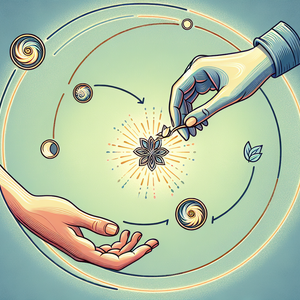The Human Touch in a Robotic Lab

Driven by the need for faster, more accurate, and cost-effective results, automation has become a cornerstone of modern laboratories. Robotic arms can pipette liquids with unmatched speed and consistency, automated systems can monitor experimental conditions in real time, and AI-powered tools can identify patterns in genetic data that would take human researchers years to decipher. These innovations have significantly accelerated progress in critical areas such as drug discovery, genetic engineering, and disease diagnostics. For instance, pharmaceutical companies increasingly rely on high-throughput screening systems, which use robotics and AI to test thousands of chemical compounds against a target disease in a fraction of the time it would take a human team. Similarly, automated systems in genetic research can sequence DNA and analyze genetic variations at a scale that was once unimaginable. These advancements, while exciting, have sparked concerns about job displacement. Biological technicians, long responsible for manual tasks such as preparing samples, running experiments, and recording data, may feel that their roles are threatened by machines capable of performing these functions more efficiently. However, while automation excels at executing predefined tasks, it remains limited in areas that require human ingenuity, oversight, and ethical judgment.
The Irreplaceable Qualities of Human Intuition
One of the most significant limitations of automation lies in its inability to think intuitively or creatively. Machines operate based on algorithms and pre-programmed instructions, excelling in tasks that involve repetition and pattern recognition. However, they lack the ability to recognize subtle anomalies or draw connections that fall outside of their programmed parameters. This is where human intuition—honed through experience and training—becomes invaluable. Consider a laboratory studying cell cultures. A robotic system may monitor cell growth and flag any deviations based on predefined criteria. Yet, an experienced biological technician might notice a slight discoloration or an unusual texture under a microscope that the system failed to detect. Such observations, though seemingly minor, could indicate early signs of contamination or other issues, potentially saving weeks or months of experimental work. Similarly, when unexpected results arise, it is often the technician who identifies possible causes, adjusts the protocol, or reconfigures the experiment. While machines execute tasks with precision, they lack the ability to think "outside the box," a skill that is often crucial in scientific research.
Ethical Decision-Making in High-Stakes Research
Another critical area where humans surpass machines is ethical reasoning. Laboratories, particularly those working in fields like biotechnology or pharmaceuticals, frequently grapple with ethical dilemmas. Whether it involves gene editing, animal testing, or clinical trials involving human subjects, these scenarios require careful consideration of moral, social, and legal implications—areas in which machines are inherently deficient. For example, an AI system might optimize a gene-editing protocol for maximum efficiency, but it lacks the ability to evaluate whether altering a specific gene is ethically acceptable. Decisions about the potential consequences of genetic modifications, such as unforeseen impacts on ecosystems or societal inequalities, require human input. Biological technicians and researchers play a vital role in ensuring that experiments comply with ethical standards, guiding the lab’s practices in a way that balances innovation with responsibility. Technicians often serve as the ethical gatekeepers in the lab, raising questions and advocating for responsible research practices. Their input is especially crucial in high-stakes projects where the outcomes could have far-reaching consequences, both scientifically and socially.
Adaptability in the Face of Uncertainty
The unpredictable nature of scientific research presents another challenge for automated systems. While machines excel at following established protocols, they often falter when faced with deviations or unforeseen issues. Research rarely goes as planned, and the ability to adapt quickly is essential to overcoming obstacles and ensuring progress. Biological technicians are uniquely skilled in responding to uncertainty. If a robotic system malfunctions during an experiment, it is the technician who diagnoses the problem and implements a solution. If unexpected variables arise—such as a newly discovered interaction between two compounds—it is the technician who evaluates how to adjust the experiment. This adaptability extends beyond troubleshooting. Technicians are often the first to recognize when a hypothesis needs to be revised or when an experiment should pivot in a new direction. Their ability to think critically and respond creatively to challenges ensures that research remains dynamic and resilient, even in the face of setbacks.
The Future: A Collaborative Lab Environment
As automation and AI continue to reshape scientific research, the role of biological technicians is not disappearing—it is evolving. Rather than replacing technicians, these technologies are empowering them to focus on higher-order tasks that require human ingenuity and oversight. In the lab of the future, humans and machines will work together as collaborators, each contributing their unique strengths. Technicians will likely take on roles as "systems managers," overseeing the setup, calibration, and maintenance of automated equipment. They may also serve as "data interpreters," using their biological expertise to contextualize the findings generated by AI and identify meaningful patterns or anomalies. Additionally, as interdisciplinary approaches become more common, technicians may need to acquire new skills in coding, bioinformatics, or data science to bridge the gap between biology and technology. For example, a technician in a high-tech lab might oversee a machine learning algorithm analyzing genetic data, ensuring that the results are accurate and relevant. They might also collaborate with engineers and computer scientists to optimize automated workflows, combining their biological knowledge with technological expertise.
The rise of automation and AI is transforming laboratories at an unprecedented pace, but it is not rendering biological technicians obsolete. On the contrary, the human touch remains indispensable in a robotic lab. Machines may excel at precision, efficiency, and repetition, but they cannot replicate the intuition, ethical reasoning, and adaptability that humans bring to the table. As technology continues to evolve, the responsibilities of biological technicians will shift, emphasizing roles that require creativity, oversight, and interdisciplinary collaboration. By embracing these changes and honing their unique strengths, biological technicians can ensure they remain vital contributors to scientific innovation. The future of research is not about choosing between humans and machines—it is about harnessing the best of both to push the boundaries of discovery and improve the world.
Automation Specialist – Laboratory Systems
Thermo Fisher Scientific, Beckman Coulter
Responsibilities
Design, implement, and maintain automated systems in research and diagnostic laboratories.
Optimize workflows by integrating robotics with AI-driven software for data analysis and experiment execution.
Troubleshoot and repair automated equipment to ensure uninterrupted lab operations.
Skills & Experience
Proficiency in programming languages like Python or R, and familiarity with robotics software such as ROS (Robot Operating System).
Strong understanding of laboratory processes, including sample preparation and high-throughput screening.
Experience working with vendors like Thermo Fisher Scientific or Beckman Coulter, which provide automation solutions.
Bioinformatics Data Analyst
Illumina, 10x Genomics
Responsibilities
Analyze large-scale genomic, proteomic, or other biological datasets using AI tools and statistical methods.
Develop custom algorithms to identify patterns, correlations, or anomalies in experimental data.
Collaborate with scientists to translate complex datasets into actionable insights for projects like drug discovery or precision medicine.
Skills & Experience
Expertise in bioinformatics tools (e.g., BLAST, Bioconductor) and programming in Python, R, or MATLAB.
Knowledge of machine learning techniques and cloud computing platforms (e.g., AWS, Google Cloud).
Familiarity with organizations like Illumina and 10x Genomics, which work heavily in sequencing and bioinformatics.
Ethics and Compliance Officer – Biotechnology
Genentech, Novo Nordisk
Responsibilities
Evaluate research protocols to ensure compliance with ethical standards and regulatory requirements (e.g., FDA, EMA).
Provide guidance on ethical issues such as gene editing, CRISPR applications, and animal or human testing.
Conduct regular audits of laboratory practices and develop policies to mitigate risks.
Skills & Experience
Background in bioethics, law, or regulatory affairs, with knowledge of frameworks like the Belmont Report or ICH guidelines.
Strong communication skills to mediate between researchers, corporate stakeholders, and regulatory bodies.
Experience in companies such as Genentech or Novo Nordisk, known for pioneering ethical biotech research.
Laboratory Systems Manager
Agilent Technologies, PerkinElmer
Responsibilities
Oversee the daily operation of automated laboratory systems, ensuring optimal performance and minimal downtime.
Train laboratory staff on the use and maintenance of automated equipment and software.
Manage procurement and upgrades for cutting-edge technologies, ensuring compatibility across lab functions.
Skills & Experience
Strong project management skills and familiarity with laboratory information management systems (LIMS).
Experience with vendors like Agilent Technologies or PerkinElmer, which supply high-tech lab systems.
A blend of technical expertise and leadership skills to coordinate multidisciplinary teams.
AI/ML Specialist – Life Sciences
Deep Genomics, Recursion Pharmaceuticals
Responsibilities
Develop and deploy AI/ML algorithms to accelerate tasks like drug discovery, protein folding analysis, and personalized medicine.
Collaborate with biologists to ensure AI models are tailored to specific experimental needs.
Monitor and improve the accuracy of predictive models by integrating feedback from experimental results.
Skills & Experience
Advanced knowledge of machine learning frameworks (e.g., TensorFlow, PyTorch) and their application in biological research.
Experience working with datasets from sources like public repositories (e.g., TCGA, ENCODE) or private experimental studies.
Companies like Deep Genomics and Recursion Pharmaceuticals are examples of leaders in this space, often seeking specialized talent.


